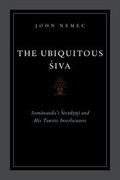
The ubiquitous siva: somananda's sivadrsti and his tantric interlocutors
Nemec, John
This book examines the beginnings of the non-dual tantric philosophy of the famed Pratyabhija or ''Recognition'' School of tenth-century Kashmir. It includes a critical edition and annotated translation of chapters 1-3 of Somananda's Sivadrsti, the first Pratyabhija text ever composed, along with the corresponding passages of Utpaladeva's commentary, the Sivadrstivatti. John Nemec examines the beginnings of the non-dual tantric philosophy of the famed Pratyabhija or "Recognition [of God]" School of tenth-century Kashmir, the tradition most closely associated with Kashmiri Shaivism. In doing so it offers, for the very first time, a critical edition and annotated translation of a large portion of the first Pratyabhija text ever composed, the Sivadrsti of Somananda. In an extended introduction, Nemec argues that the author presents aunique form of non-dualism, a strict pantheism that declares all beings and entities found in the universe to be fully identical with the active and willful god Siva. This view stands in contrast to the philosophically more flexible panentheism of both his disciple and commentator, Utpaladeva, and the very fewother Saiva tantric works that were extant in the author's day. Nemec also argues that the text was written for the author's fellow tantric initiates, not for a wider audience. This can be adduced from the structure of the work, the opponents the author addresses, and various other editorial strategies. Even the author's famous and vociferous arguments against the non-tantric Hindu grammarians may be shown to have been ultimately directed at an opposing Hindu tantric school that subscribed tomany of the grammarians' philosophical views. Included in the volume is a critical edition and annotated translation of the first three (of seven) chaptersof the text, along with the corresponding chapters of the commentary. These are the chapters in which Somananda formulates his arguments againstopposing tantric authors and schools of thought. None of the materials made available in the present volume has ever been translated into English, apart from a brief rendering of the first chapter that was published without the commentary in 1957. None of the commentary has previously been translated into anylanguage at all. I. Introduction to the Translation.1. Introduction2. About this bookSomananda's Works and His Biography3. The Author and His Works4. Somananda's Biography and AutobiographyThe Author's Thought and the Intellectual History of the Pratyabhija5. Somananda's ''Settled Opinion'' (siddhanta)6. Divergences Between the Writings of Somananda and Utpaladeva7. The Use of Trika and Technical Terminology in the Sivadrsti8. The Influence of the Trika VBh on the SivadrstiSomananda's Tantric Interlocutors, and the Philosophy of the Grammarians9. The Tantric Post-Scriptural Schools and Authors Known to Somananda10. The Sivadrsti and the Spanda School11. Krama Influences on the Sivadrsti12. Somananda and the Saiva Siddhanta13. The Sivadrsti and the Philosophy of the Grammarians14. Bhatta Pradyumna and his Tattvagabhastotra15. Conclusions: Somananda's Sivadrsti and the Emergence of the PratyabhijaAbout the Edition and the Translation16. The Manuscripts of the Sivadrsti17. About the Edition18. About the TranslationAbbreviationsII. The Translation.Chapter One of the Sivadrsti and Sivadrsativrtti: Siva and His PowersChapter Two of the Sivadrsti and Sivadrsativrtti: The Arguments Against the GrammariansChapter Three of the Sivadrsti and Sivadrsativrtti: The Arguments Against theSaktasIII. The Edition.Critical Edition of Chapter One of the Sivadrsti and SivadrsativrttiCritical Edition of Chapter Two of the Sivadrsti and SivadrsativrttiCritical Edition of Chapter Three of the Sivadrsti and SivadrsativrttiBibliography
- ISBN: 978-0-19-979546-8
- Editorial: Oxford University
- Encuadernacion: Rústica
- Páginas: 456
- Fecha Publicación: 10/11/2011
- Nº Volúmenes: 1
- Idioma: Inglés
